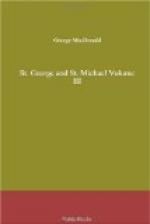’Art thou not an exorciser, then, Mr. Vaughan, as well as a discerner of spirits? I would thou couldst drive the said demon out of me, for truly I love him not.’
’Through all thy hate thou lovest him more than thou knowest. Thou seest him vile, but instead of casting him out, thou mournest over him with foolish tears. And yet thou dreamest that by dying thou wouldst be rid of him. No, it is back to thy childhood thou must go to be free.’
’That were a strange way to go, sir. I know it not. There seems to be a purpose in what you say, Mr. Vaughan, but you take me not with you. How can I rid me of myself, so long as I am Rowland Scudamore?’
’There is a way, sir Rowland—and but one way. Human words at least, however it may be with some high heavenly language, can never say the best things but by a kind of stumbling, wherein one contradiction keepeth another from falling. No man, as thou sayest, truly, can rid him of himself and live, for that involveth an impossibility. But he can rid himself of that: haunting shadow of his own self, which he hath pampered and fed upon shadowy lies, until it is bloated and black with pride and folly. When that demon king of shades is once cast out, and the man’s house is possessed of God instead, then first he findeth his true substantial self, which is the servant, nay, the child of God. To rid thee of thyself thou must offer it again to him that made it. Be thou empty that he may fill thee. I never understood this until these latter days. Let me impart to thee certain verses I found but yesterday, for they will tell thee better what I mean. Thou knowest the sacred volume of the blessed George Herbert?’
‘I never heard of him or it,’ said Scudamore.
’It is no matter as now: these verses are not of his. Prithee, hearken:
’I carry with, me, Lord, a
foolish fool,
That still his
cap upon my head would place.
I dare not slay him, he will
not to school,
And still he shakes
his bauble in my face.
’I seize him, Lord, and bring
him to thy door;
Bound on thine
altar-threshold him I lay.
He weepeth; did I heed, he
would implore;
And still he cries
alack and well-A-day!
’If thou wouldst take him
in and make him wise,
I think he might
be taught to serve thee well;
If not, slay him, nor heed
his foolish cries,
He’s but
a fool that mocks and rings a bell.’
Something in the lines appeared to strike Scudamore.
‘I thank you, sir,’ he said. ’Might I put you to the trouble, I would request that you would write out the verses for me, that I may study their meaning at my leisure.’
Mr. Vaughan promised, and, after a little more conversation, took his leave.
Now, whether it was from anything he had said in particular, or that Scudamore had felt the general influence of the man, Dorothy could not tell, but from that visit she believed Rowland began to think more and to brood less. By and by he began to start questions of right and wrong, suppose cases, and ask Dorothy what she would do in such and such circumstances. With many cloudy relapses there was a suspicion of dawn, although a rainy one most likely, on his far horizon.




